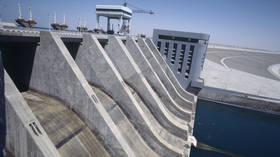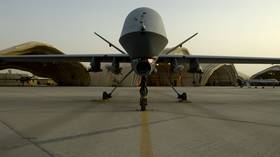US nearly wiped out tens of thousands of civilians with dam strike in Syria – NYT
The military then dismissed reports of the bombing as “crazy” and preemptively blamed ISIS

In 2017, the US bombed a piece of strategic infrastructure in Syria, the Tabqa Dam on the Euphrates River, despite it being on a no-strike list, the New York Times reported.
A B-52 bomber dropped some of the heaviest weapons in the US Air Force arsenal on the target, including at least one BLU-109 bunker buster, which is designed to destroy fortified concrete targets. This bomb pierced through five stories in one of the dam’s towers, but didn’t explode.
If the Soviet-designed earth-and-concrete structure had failed, tens of thousands of people living in a valley below would likely have died.
The dam wasn’t immediately destroyed, but damage to its equipment rendered it inoperational and at risk of overflowing. An unprecedented truce involving the terrorist group Islamic State (IS, formerly ISIS), US-backed forces on the ground, and Syrian government forces was hastlily struck with Russia’s help to allow a crane controlling emergency floodgates to be repaired.
After the work was done by a crew of 16 workers, a drone strike ordered by the same taskforce that called in the initial strike obliterated a van carrying some of them back. It killed a mechanical engineer, a technician, and a Syrian Red Crescent worker.
The events were described by the Times based on interviews with unnamed US military officials as well as people in Syria, including an engineer who was present at the dam on the day of the strike. It is the newspaper’s latest expose of Talon Anvil operations, which critics call reckless. The taskforce was created to coordinate the war effort against IS and was staffed by US Army Delta Force commandos, according to previous reporting.
The March 26 strike on the Tabqa Dam was attributed to US forces by Russia and Syria, but then-Lt. Gen. Stephen J. Townsend, under whose purview the taskforce operated, dismissed it as “a lot of crazy reporting.”
“The Tabqa Dam is not a coalition target and when strikes occur on military targets, at or near the dam, we use non-cratering munitions to avoid unnecessary damage to the facility,” he assured journalists.
If something happens to the Tabqa Dam, it will be at the hands of ISIS, not the coalition.
According to Times sources, Talon Anvil routinely used a trick to circumvent the airstrike vetting process by senior command, citing the urgency of defending US allied forces from an imminent attack. The strike on the dam was also justified that way, but witnesses said no major fighting in the area was taking place before the bombs hit.
US Central Command acknowledged dropping three 2,000-pound bombs, but said they were targeting towers, not the dam itself. And that the fact it didn’t fail proved the safety of the operation, a spokesman for the military suggested. He denied that the usual procedures were sidestepped in authorizing the strikes.
The Times said a report requested from specialized engineers in the Defense Intelligence Agency’s Defense Resources and Infrastructure office prior to the strikes recommended against using any sort of explosives in the vicinity of the dam. Even relatively small munitions like Hellfire missiles could damage concrete structures controlling the flow of water, the four-page assessment said, according to the newspaper.
Talon Anvil had not reported the dam strikes. The US military had to piece together what had happened by reviewing logs from the B-52 bomber, a source told the Times. No disciplinary action was taken against members of the secret unit, the newspaper reported.
https://www.rt.com/news/546722-us-bombed-dam-syria/


0 Comments:
Post a Comment
Subscribe to Post Comments [Atom]
<< Home